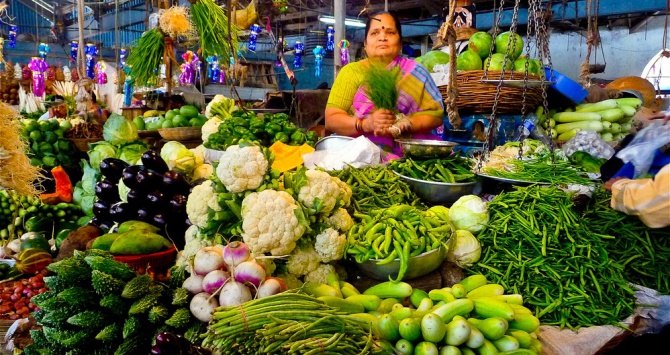MSc Development Management student JeongYeon Cho and MSc Development Studies Peter Bland student share their reflections on the Department’s most recent Cumberland Lodge trip (27-19 October 2023) which was themed around Rethinking Development.
Having finished the first half of the Autumn term of our master’s programme, students took the 2-hour bus to escape the hectic city. Our Journey to Cumberland Lodge in Windsor was rainy and cloudy, as usual British weather. However, our time in the Cumberland Lodge was pleasant and encouraged us to rethink ‘development’ with our amazing peers in the department.
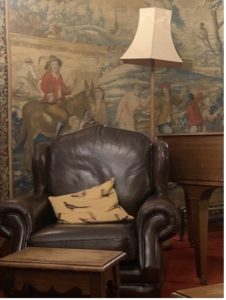
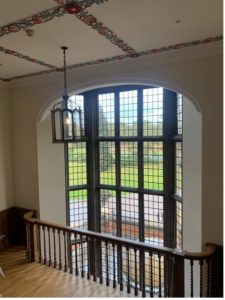
After we arrived at Cumberland Lodge, the staff gave us a general introduction and let us put our bags in our room. My roommate and I said hi and moved to the bar on the ground floor. There were already a few students in the bar, and we joined them to socialise. The bar provided alcohol, including a Cumberland Lodge pale ale, and free tea and coffee. At 7 p.m. we had a dinner of fishcakes and parsnip soup, which was one of the greatest British-style foods that I’ve had in the UK. To be honest, students, including me, were impressed with the quality of the food. After dinner, we had the first workshop session of this trip with Dr. Dann Naseemullah from King’s College London. Through his keynote speech, we were able to summarise and map out key development trends, from modernization theory to the concept of the developmental state. As Dr. Naseemullah said, ‘development’ itself is a contested concept, and the concept and direction of ‘development’ has changed throughout time.
On the second day, it was my Birthday, and my friends sang happy birthday for me at breakfast (thank you so much!). Our second workshop session was about development theory, which scopes the targeting country from the global south to worldwide. Professor Kate Meagher led the session by explaining global development theory and focusing on global south theory. After her speech, we discussed which of the theories was a better lens to analyse various topics. Our group discussed ‘corruption’, and there were other topics such as industrial policy, COVID-19 and green growth. After this session, we could draw a big picture of development theory by ensuring our focus on the global south while expanding the scope beyond the global south.
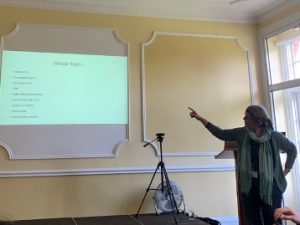
The third session, led by Professor Tim Forsyth, was about climate change issues in development. He emphasised the need to target not only climate change itself but also its impact on local people by critically analysing Greta Thunberg’s comment; “Some people say that we should study to become climate scientists so that we can ‘solve the climate crisis’. But the climate crisis has already been solved. We already have all the facts and solutions. All we need to do is to wake up and change.” According to Professor Forsyth, it is important to consider not only ‘gas emissions’ but also the vulnerability and inequality of minorities.
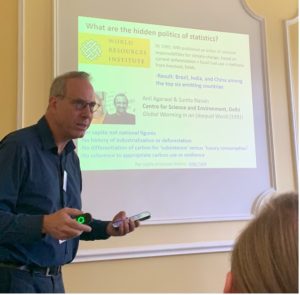
After the two morning sessions, we moved to the dining area and had lunch. Then, students and teaching staff walked through the great Windsor Park, where you can see the Windsor Castle. In the park, which was huge and beautiful, we saw deer and horses wandering around us. Even though it was heavily raining, it was so nice to see the great landscape with good company. The following workshop session was called exploring Ethics: International Development and was held by the fellow of Cumberland Lodge. Of course, after this session, we moved to the bar and dining area. Personally, I really enjoyed the socialising time since I could informally talk with both professors and students.
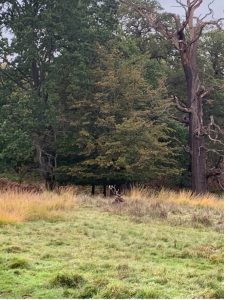
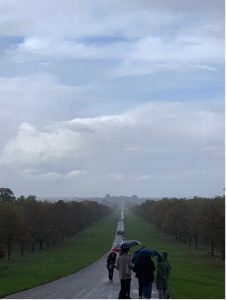
The next morning, we started the last workshop session, which was about decolonizing sources, actors, and agendas, while some of the students went to the chapel to attend the service. Two PhD students, Stephanie Wanga and Jorich Loubser, were guiding the session by sharing their experiences in higher education. It was great to look back the reading lists from our modules to see if they were reflective of the reality of development or if they were biased by western standards.
To sum up, the Cumberland Lodge trip as a really good opportunity to engage with good people in the department and share valuable ideas about related topics in development.
JeongYeon Cho
There are less conspicuous times of year to visit a great house in the middle of the country than the end of October. The interiors are antique, seemingly preserved from a century before; saturnine figures occasionally break from the gravel paths ribboning the grounds to head out into the gardens without reason; and on the first night, when the darkness falls early, you feel yourself at the beginning of a ghost story.
We are at the Cumberland Lodge, an estate on what was once the grounds of Windsor Castle. It feels like a hotel – but isn’t exactly. The rooms are numbered, but you can’t rent them out. Instead, on occasions such as these, they are turned over to groups – mostly students – for academic workshops and residential courses – supposedly, at least.
I say “supposedly” because the sense I got from the weekend, confirmed to me later by a professor as we both walked to the main building through the rain, was that these workshops were less the point than an excuse to allow about 30 members of the International Development Department to gather about the bar or along the oak dining tables of the refectory and exchange ideas, jokes, passing thoughts, book recommendations – all in all to engage in lively conversation.
This is not to imply that the workshops were meaningless – far from it! Our speakers were set with addressing “the important paradigm-challenging debates… that have arisen from the ‘polycrisis’ in global affairs;” it’s an ambitious and frankly daunting assignment, but I believe they were still able to meet it with the appropriate zeal.
We began the evening we arrived, with Dann Naseemullah of King’s College speaking on development’s uncertain past and less certain future, and continued from there. We were told about the meaning and origins of ethics, how to decolonise a subject so thoroughly rooted in colonisation, whether it’s time to expand our focus beyond the Global South, and – my personal favourite – the impossible complexity of climate change: one would naturally assume it better to mitigate global warming than to adapt to it, but what if that mitigation comes at the expense of the livelihoods of the world’s poorest? Is a large-scale tree plantation worth the carbon it sucks from the atmosphere if it costs any number of people the arable land they use to sustain themselves?
The beautiful thing is that the answers are not provided – and how could they be in an hour and a half? The questions are rather for us to try and answer ourselves. The workshops act as a framing device, coming before substantial meals and the long evening socials and thereafter making up the substance of conversations had over crème brûlée, pints of locally brewed beer and games of ping pong. They’re the engine which moves young scholars to meet, and for ideas to collide in the process.
Before I came to the Lodge, I had perhaps exchanged a handful of words with a handful of my colleagues. Seminars felt more like a formality of my timetable than a space where I was excited to debate the literature; I very often attended lectures alone. I sense, however, that the last few days may have changed that. At the least, I’ve put a good number of names to faces and exchanged plenty of words of introduction; I may even have made some permanent friends along the way. What can I say other than I wholeheartedly recommend it?
Peter Bland
The views expressed in this post are those of the author and in no way reflect those of the International Development LSE blog or the London School of Economics and Political Science.
Featured images: JeongYeon Cho



